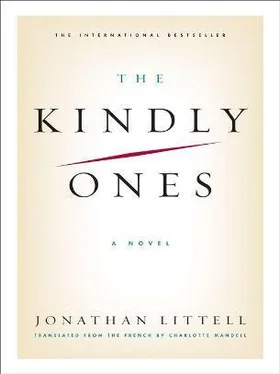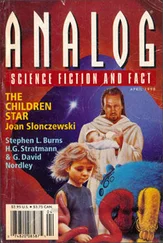Jonathan Littell - The Kindly Ones
Здесь есть возможность читать онлайн «Jonathan Littell - The Kindly Ones» весь текст электронной книги совершенно бесплатно (целиком полную версию без сокращений). В некоторых случаях можно слушать аудио, скачать через торрент в формате fb2 и присутствует краткое содержание. Год выпуска: 2009, ISBN: 2009, Издательство: HarperCollins e-books, Жанр: Историческая проза, на английском языке. Описание произведения, (предисловие) а так же отзывы посетителей доступны на портале библиотеки ЛибКат.
- Название:The Kindly Ones
- Автор:
- Издательство:HarperCollins e-books
- Жанр:
- Год:2009
- ISBN:978-0-06-177548-2
- Рейтинг книги:4 / 5. Голосов: 1
-
Избранное:Добавить в избранное
- Отзывы:
-
Ваша оценка:
- 80
- 1
- 2
- 3
- 4
- 5
The Kindly Ones: краткое содержание, описание и аннотация
Предлагаем к чтению аннотацию, описание, краткое содержание или предисловие (зависит от того, что написал сам автор книги «The Kindly Ones»). Если вы не нашли необходимую информацию о книге — напишите в комментариях, мы постараемся отыскать её.
The Kindly Ones The Kindly Ones Massive in scope, horrific in subject matter, and shocking in its protagonist, Littell's masterpiece is intense, hallucinatory, and utterly original. Critics abroad have compared this provocative and controversial work of literature to Tolstoy's War and Peace, a classic epic of war that, like The Kindly Ones, is a morally challenging read.
The Kindly Ones — читать онлайн бесплатно полную книгу (весь текст) целиком
Ниже представлен текст книги, разбитый по страницам. Система сохранения места последней прочитанной страницы, позволяет с удобством читать онлайн бесплатно книгу «The Kindly Ones», без необходимости каждый раз заново искать на чём Вы остановились. Поставьте закладку, и сможете в любой момент перейти на страницу, на которой закончили чтение.
Интервал:
Закладка:
Downstairs, I found Moreau sitting in a garden chair in a square of sunlight, in front of the French windows to the living room. It was rather cool out. “Hello,” he said in his sly way. “Sleep well?”—“Yes, thanks. Has my mother gotten up?”—“She’s awake, but she’s still resting. There’s some coffee and toast on the table.”—“Thanks.” I went to serve myself and then came back to him, cup of coffee in hand. I looked at the grounds. I didn’t hear the twins anymore. “Where are boys?” I asked Moreau.—“At school. They come back in the afternoon.” I drank a little coffee. “You know,” he continued, “your mother is happy you’ve come.”—“Yes, that’s possible,” I said. But he placidly went on with his thought: “You should write more often. Times are going to be hard. Everyone is going to need their family. Family is the only thing you can count on.” I didn’t say anything, just watched him absently; he was contemplating the garden. “Listen, Mother’s Day is next month. You could send her your best wishes.”—“What is this holiday?” He looked surprised: “The Maréchal instituted it, two years ago. To honor maternity. It’s in May, this year it falls on the thirtieth.” He was still looking at me: “You could send a card.”—“Yes, I’ll try.” He fell silent and turned back to the garden. “If you have time,” he said after a while, “could you go cut some wood in the shed, for the stove? I’m getting old.” I looked at him again, huddled in his chair: in fact, he had aged. “If you like,” I replied. I went back into the house, put the empty cup on the table, nibbled on a cracker, and went upstairs; this time I went straight to the attic. I closed the trapdoor behind me and walked carefully between the furniture and boxes, making the floorboards creak under my feet. My memories rose around me, tactile now with the air, the smell, the light, the dust: and I dove into these sensations as I had plunged into the Volga, with complete abandon. It seemed to me I could see the shadow of our bodies in the recesses, the brightness of our white skins. Then I shook myself and found the boxes containing my things. I dragged them into a large empty space near a pillar, crouched down, and began sorting through them. There were tin cars, report cards, and school notebooks, youth novels, photographs in thick envelopes, more envelopes, sealed, containing letters from my sister—a whole past, strange and sudden. I didn’t dare look at the photos or open the envelopes; I felt an animal terror growing in me; even the most commonplace, innocent details bore the imprint of the past, of that past, and the very fact of this past chilled me to the bone; each new but so familiar object inspired in me a mixture of repulsion and fascination, as if I were holding a live bomb in my hands. To calm down, I examined the books: it was the collection of any adolescent of my generation—Jules Verne, Paul de Kock, Victor Hugo, Eugène Sue, the Americans E. R. Burroughs and Mark Twain, the adventures of Fantômas and Rouletabille, travel books, some biographies of famous men. I was seized with the desire to reread some of them and, after reflection, I put aside the first three volumes of Burroughs’s Martian series, the ones that had so excited my fantasies in the upstairs bathroom, curious to see if they would still correspond to the intensity of my memories. Then I returned to the sealed envelopes. I weighed them in my hands, turned them over between my fingers. In the beginning, after the scandal, when we were sent to boarding school, my sister and I were still allowed to write to each other; when I received one of her letters, I had to open it in front of a priest and give it to him to read before I could myself; and she, on her side, probably had to do the same thing. Her letters, curiously written on a typewriter, were long, edifying, and solemn: My dear brother: Everything is fine here, they’re treating me nicely. I am awakening to a renewed sense of spirituality , etc. But at night, I locked myself up in the bathroom with a candle stub, trembling with anxiety and excitement, and held the letter over the flame until a second message appeared, scribbled between the lines with milk: HELP! GET ME OUT OF HERE! I BEG YOU! We had gotten that idea by reading, secretly of course, a life of Lenin, found at a bookseller’s near the mairie. These desperate messages threw me into panic, and I decided to run away and save her. But my attempt was poorly prepared, and I was soon caught. They punished me severely, I was given the cane and a week of stale bread, and the abuse of the older boys only got worse, but it was all the same to me; only, they had forbidden me from receiving any letters, and that plunged me into rage and despair. I didn’t even know if I had saved those last letters, if they too were in these envelopes; and I didn’t want to open them to check. I put everything away in the boxes, took the three books, and went back downstairs.
Compelled by a silent force, I went into Una’s old room. There was now a double bed there, a wooden one painted red and blue, and toys carefully lined up, among which I angrily recognized some of my own. All the clothes were folded and put away in drawers and in the wardrobe. I quickly searched through the room looking for clues, letters, but found nothing. The family name written on the report cards was unknown to me, and seemed Aryan. These report cards went back a few years: so they had been living here for quite some time. I heard my mother behind me: “What are you doing?”—“I’m looking,” I said without turning round.—“You’d do better to go downstairs and cut wood as Aristide asked you. I’m going to get lunch ready.” I turned around: she was standing in the doorway, severe, impassive. “Who are these children?”—“I told you: the children of a close friend. We took them in when she couldn’t look after them anymore. They didn’t have a father.”—“How long have they been here?”—“A while. You left a long time ago too, my boy.” I looked around me, then stared at her again: “They’re little Jews, aren’t they? Admit it. They’re Jews, right?” She didn’t let herself be intimidated: “Stop talking nonsense. They’re not Jews. If you don’t believe me, just look at them when they’re taking their bath. That’s how you do it, isn’t it?”—“Yes. Sometimes that’s how we do it.”—“Anyway, even if they were Jews, what difference would that make? What would you to do them?”—“I wouldn’t do anything to them.”—“What do you do, with the Jews?” she went on. “We hear all kinds of horrors. Even the Italians say it’s not acceptable, what you’re doing.” I felt suddenly old, tired: “We send them to work, in the East. They build roads, houses, they work in factories.” She stuck to her guns: “And the children? You send them away to build roads? You take the children too, don’t you?”—“The children go to special camps. They stay with the mothers who can’t work.”—“Why do you do that?” I shrugged: “Someone had to do it. The Jews are parasites, exploiters: now they’re serving the people they used to exploit. And I should point out that the French help us a lot: in France, it’s the French police who arrest them and hand them over to us. It’s French law that decides. Someday, history will judge that we were right.”—“You are completely mad. Go cut the wood.” She turned around and headed to the side stairs. I went to put the three Burroughs books in my bag, then went out to the shed. I took off my jacket, picked up the axe, put a log on the block, and split it. It was difficult, I wasn’t used to this kind of work; I had to start over several times. As I raised the axe, I thought about my mother’s words; it wasn’t her lack of political comprehension that bothered me, it was the way she looked at me: What did she see, when she looked at me? I could feel the extent to which I labored under the weight of the past, of wounds received or imagined, of irreparable mistakes, of the unredeemability of time. Struggling against it did no good. When I got some logs finished, I loaded them up in my arms and carried them to the kitchen. My mother was peeling potatoes. I put the wood on the woodpile near the stove and went out again without a word, to split some more. I made several trips this way. As I worked, I thought: in the end, the collective problem of the Germans was the same as my own; they too were struggling to extract themselves from a painful past, to wipe the slate clean so they’d be able to begin new things. That was how they arrived at the most radical solution of them all: murder, the painful horror of murder. But was murder a solution? I thought of the many conversations I had had about this: in Germany, I wasn’t the only one to have my doubts. What if murder weren’t a definitive solution, what if on the contrary this new fact, even less reparable than the ones before it, opened in turn onto new abysses? Then, what way out was left? In the kitchen, I noticed I still had the axe with me. The room was empty: my mother must have been in the living room. I looked at the pile of wood; there seemed to be enough there. I was dripping with sweat; I put the axe in the corner next to the wood and went up to wash and change my shirt.
Читать дальшеИнтервал:
Закладка:
Похожие книги на «The Kindly Ones»
Представляем Вашему вниманию похожие книги на «The Kindly Ones» списком для выбора. Мы отобрали схожую по названию и смыслу литературу в надежде предоставить читателям больше вариантов отыскать новые, интересные, ещё непрочитанные произведения.
Обсуждение, отзывы о книге «The Kindly Ones» и просто собственные мнения читателей. Оставьте ваши комментарии, напишите, что Вы думаете о произведении, его смысле или главных героях. Укажите что конкретно понравилось, а что нет, и почему Вы так считаете.










